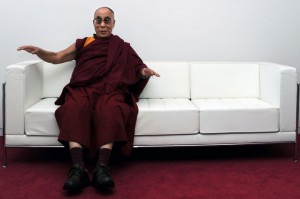Lean Out
 Dear Friends,
Last month I read the book Lean In by Facebook and Google executive, Sheryl Sandberg. Just after I finished the book, I happened to have dinner with my college age daughter, quite a feminist herself, and I shared the basic premise of the book.
Dear Friends,
Last month I read the book Lean In by Facebook and Google executive, Sheryl Sandberg. Just after I finished the book, I happened to have dinner with my college age daughter, quite a feminist herself, and I shared the basic premise of the book.
One of Sandberg's key stories is about a time when she hosted a meeting at Facebook for a Treasury secretary. The secretary brought a team of four women with him, and many of the other invited guests were men. The men all took seats at the main table, and the women sat in chairs off to the back. Even when Sandberg invited them up, the women stayed in their seats behind the main table.
Sandberg sees this as an analogy for women in the workplace, and she invites women reading her book to lean in to the business world, rather than take the seats off to the back. When I read this, I thought, "Yeah, that's right! Why do we women so often sit in the back? We should take the seats at the front just like the men."
So I shared all of this with my daughter, and to my great surprise, she said, "Why should we follow the men by leaning in? Why don't men practicing leaning out?"
It took me a moment to understand what she was saying, but when I did I realized that she had an interesting point. What would it be like if everyone leaned out? What if all the men and women in Sandberg's meeting humbly took the back row? Would the Dalai Lama take the front row or the back row? What about Thich Nhat Hanh? Or Mother Theresa? And I am sure you can think of other strong, courageous people who would sit in the back row because they don't think they are the only ones with the answers.
What would the world look like if we all took the back row? If we leaned out, rather than leaning in? It wouldn't mean not promoting agendas for positive change in the world. It may mean we offer our own insights and at the same time recognize that other people, and even other species, might have something to offer us.
"Giving up always being right doesn't mean you forsake your opinions or your right to seek social justice, but you are not defensive, judgmental, or self-righteous in your approach to life. You mindfully live with the fact that even when you're wrong it's okay because you are coming from your deepest intention. Also, you learn from being wrong (or right), therefore you become a more effective person." -- Phillip Moffitt
Phillip Moffitt teaches the profound and, for me, very challenging practice of letting go of our need to be right. When we look mindfully at our behavior, we see all the places where we literally or figuratively take the front seat because we are sure we are right. We think we know best. Taking the seat in the back simply means that we aren't convinced that our way is the right or only way. And in so doing we offer others the gift of being heard, and ourselves the gift of hearing others. The view from the back is definitely more inclusive.
Science and the Buddha both teach that it is wise not to accept anything without trying it out for ourselves. So why not try taking the back seat? Try leaning out, listening more, and saying less. Try letting go of your attachment to being right. And observe-- does it lead to less suffering for yourself and those in your life? Sheryl Sandberg may not agree, but I will take a lesson from my feminist daughter and many wise spiritual teachers, and try leaning out for a while.
